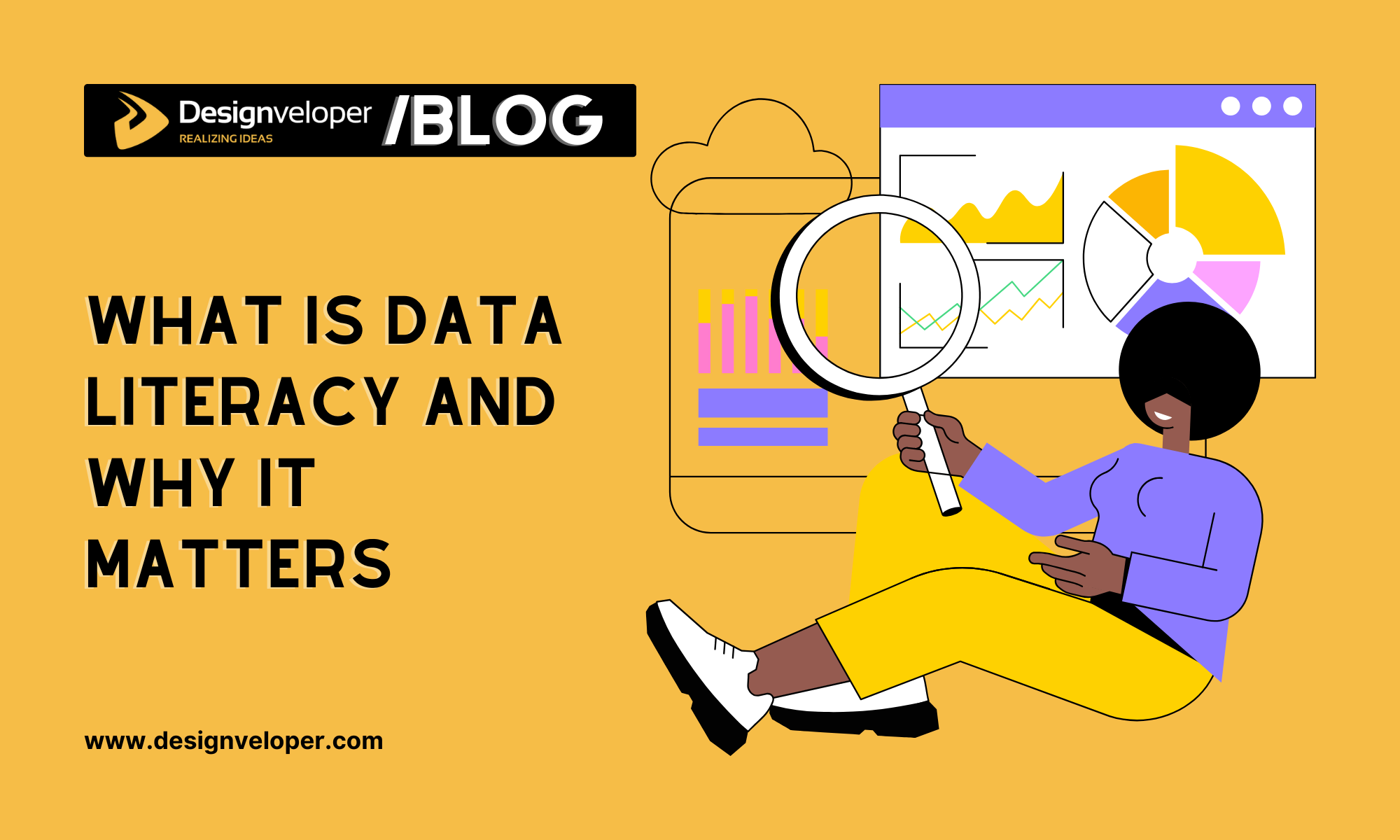What is Data Literacy and Why It Matters in 2025

In the modern world of heavy data, data literacy is rapidly becoming a critical skill. A recently published report by DataCamp found that 86% of business leaders think that data literacy is crucial for their team’s daily work. The advantage of this skill is that people and businesses can make better decisions, be more productive, and stay in the competition. But, what is data literacy, really?
Understanding Data Literacy
Data literacy is about the ability to read, understand and create data as information. It’s a learned skill and, in fact, one of the crucial parts in today’s data driven world. The State of Data Literacy Report 2024 tells us 86% of leaders see data literacy as an important tool for their team’s daily work. This skill helps people make proper decisions and solve problems using data.
Healthcare is one example of data literacy in motion. Patient data is used by doctors to determine illnesses and future outcomes. In marketing likewise, businesses examine customer data to customize their campaigns.

In addition, it increases productivity. Data-literate employees speed up decision making, according to the report by DataCamp. They’re good at it because (they can) interpret data quickly and accurately.
Companies are now investing in training programs to improve data literacy. However, these programs train employees in how to responsibly and ethically deal with data. DataCamp for Business comes with courses and hands-on projects to train data skills.
Key Components of Data Literacy
Data Interpretation is about understanding and making sense out of data. Since it’s about reading charts, graphs and tables to draw out meaning. For instance, a marketer could use sales data to see if they can identify trends and patterns as they relate to forming future campaigns, for instance.
Data Analysis is the systematic application of different statistical and logical techniques to describe, consolidate and make comparison of the data. It usually requires software tools to handle large data. For example, a financial analyst might utilize data analysis to predict future how a stock will do using historical data.
Data literacy requires Critical Thinking. That’s questioning assumptions, evaluating evidence, making reasoned conclusions. For example, a healthcare professional might critically evaluate data gathered in a clinical trial to draw conclusions about the effectiveness of a new treatment.
These skills have recently been the subject of growing reports. The State of Data Literacy Report 2024 claims that 86% of business leaders feel data literacy is a must for their teams to accomplish their day-to-day work. That said, it goes to show the importance of strengthening data interpretation, analysis, and critical thinking skills so that people can survive in today’s data culture.
The Importance of Data Literacy in 2025
Now in 2025 data literacy is an essential skill for both individuals and organizations. The State of Data Literacy Report 2024 found that 86 percent of leaders believe that data literacy is critical for their teams’ daily work, yet only 12 percent of people today can perform basic data literacy tasks across the enterprise. This brings up the fact that data is increasingly important to know and work with as the world is becoming more data driven.
Rapid technological advancement is one of the reasons for this shift. Industry begins to be generative AI and big data driven, so the employees need to be data literate now. Take, for instance, businesses that have adopted data literacy programs – they experience higher job placement rates and a better ability to make decisions.
And it’s not just about reading data. It is also about the ability to communicate findings effectively too. This is especially useful in areas of work where data driven choices have a massive impact on patient outcomes, such as in the healthcare field.
Increased Reliance on Data in Decision-Making Processes
Organizations continue to look toward data for decision making in 2025. McKinsey & Company’s report has recently brought to light that companies that turn to data driven strategies outperform their competitors by 23%. This proves that data can provide useful insights and will help you make better decisions.
Take, for example, a report by CastorDoc showing that companies that have tightly governed data are better positioned to successfully put AI solutions in motion. High quality data enables these companies to make sure that their AI models accurately predict. Coursera has another report on how data literacy is imperative on every level of an organization. Employees who know how to interpret and apply data contribute to better decision making.
As a bonus, citizen analysts (or people, other than data scientists, with data literacy skills) have democratized access to the data across organizations. This is a trend that facilitates a more inclusive approach to decision making where insights aren’t available to a few but can be drawn upon by more people throughout the business.
The Role of Data Literacy in the Digital Economy
In 2025, data literacy will become a turning point in the digital economy. The ability to not only look at data, but understand and utilize it is critical as we live in a data driven world for both businesses and personal use. In a report, McKinsey reveals how data literacy is reshaping what it means to be a ‘data-driven’ business and the importance of data to driving growth and innovation.

Data literacy, it’s the one skill that the next generation graduating from school and university lacks: 90% of the respondents in DataCamp’s State of Data Literacy Report 2023 indicates that schools and universities should ensure that students enrolled in courses incorporating data literacy. What this highlights, however, is the need for systemic change to arm future generations with the skills they need to excel in the digital economy.
Besides reading and analysing data, data literacy is also about making data driven decisions. For example, firms such as Google and Amazon apply data analytics on instance wise to customize user experiences and improve customer satisfaction. This shows data literacy can result in better business outcomes and competitive advantage.
Impact on Businesses and Organizations
In 2025, data literacy is a skill that all businesses and organizations need. Companies that put data literacy first realize significant gains in decision making and operations efficiency. An example is a McKinsey report which indicates that organizations having high levels of data literacy are 23 percent more likely to outperform their competitors.
Besides, data literate employees can use data to innovate and collaborate. According to Coursera’s study, companies with data-literate teams are 15% more productive and 20% less costly. Employees can make decisions quickly and based on well reasoned options, not bogged down with conventional problem solving processes.
Moreover, mastering data literacy takes organizations through the labyrinth of data privacy and security. The State of the Data Lakehouse Report for 2025 says companies with data literacy programs in place are better able to corral data governance problems, ensuring regulatory compliance and protecting sensitive data.
In 2025, data literacy is not only a nice skill to have, but is essential for businesses that want to succeed in their data driven environment. Organizations can simply turn the opportunities, performance, and innovation upside down by cultivating a data literacy influenced culture.
Benefits of Being Data Literate
In 2025 data literacy is more important than ever. In a recent DataCamp report, 86% of business leaders agreed that their teams need to have data literacy to complete daily tasks. Individuals with this skill are capable of making informed decisions, noticing trends and increasing productivity. For example, Qlik found that 85 percent of business leaders expect their employees to make use of data when making decisions.
Improved Job Prospects and Career Advancement
In 2025, data literacy is a game changer for job seekers. As per the State of Data Literacy Report 2023, 89% of UK business leaders, and 78% of US business leaders think that data skills are crucial for their employees. As a result, those who have data literacy skills have the most likely chance to land a job, and to advance in their career.
For example, data scientists, information security analysts, and statisticians all are examples of some of the fastest growing occupations. These roles are in high demand, with each having great potential for career growth, U.S Bureau of Labor Statistics says. Furthermore, candidates who have strong data literacy skills would be paid a higher salary by the leaders.
It also is also a good thing to be upskilled for data literacy as this becomes a key competitive edge. Investing time to learn data skills is beneficial to those who do because they develop their decision making, problem solving, and critical thinking skills. As a result, they are precious assets to any organisation. For example, individuals with data literacy skills are able to analyze difficult data sets, find patterns, and make data based decisions.
Enhanced Decision-Making and Problem-Solving Skills
Data literacy helps individuals to make data driven instead of gut driven decisions. A 2022 Qlik survey reveals that 85% of business leaders agree that data literacy will be critical to business success in future. With this skill, professionals can easily identify trends in data, analyze and even solve problems with ease.
For instance, it was reported that companies in the top quartile for data driven decision making are 5% more productive and 6% more profitable than comparable companies. Organizations can make better strategic decisions as they understand and explain data, to improve performance and growth.

In addition, data literacy assists in risk identification and mitigation. According to a report, companies that use data analytics to enhance their understanding of customer behavior are 23x more likely to gain customers and 6x more likely to convert customers. It emphasizes data literacy, the impact it can have on business outcomes.
Data literacy in healthcare allows professionals to analyze patient’s data, diagnose trends, and recommend customized treatment plan for each individual when applied. However, it does improve patient outcomes and also improves healthcare services overall efficiency.
Greater Ability to Identify Trends and Insights
One of the greatest benefits of being data literate is that you can find more trends and insights. In this data driven world it is important to make informed decisions and that’s the reason this skill is important these days. As an example, a current review by DataCamp shows that 89% of UK chief administrators and 78% of US chief administrators trust data literacy to be a key ability for their teams to complete projects daily. It shows the significance of grasping and comprehension of data.
In addition, it allows one to spot patterns and trends that would otherwise remain unnoticed. For instance, as Data Science 4 Everyone pointed out in its study, teaching data literacy skills to students can make it easier for them to analyze, visualize data and draw better conclusions. This isn’t something that is limited just to the workplace, you can also use it in your everyday life, for example, predicting market trends or even personal finance.
Furthermore, data literacy develops a culture of evidence based decision making. When employees are told to find conclusions from analysing data, organizations will be able to solve problems more systematically and more effectively. As a result, solutions are found more efficiently and the performance overall is improved.
Conclusion
In 2025, understanding “what is data literacy” is more crucial than ever. Based on recent reporting, 89% of business leaders in the UK and 78% in the US believe that data literacy is critical for their teams to do their jobs every day. Developing this skill enables people to make decisions, drive innovation and productivity. For instance, companies that have data literate employees make better and more accurate decisions and are providing better customer experiences. Not only can individuals and organisations invest in data literacy training to stay competitive in a data driven world.
At Designveloper, we are committed to helping organizations build a thriving data culture. Our expertise in web and software development, combined with our focus on data literacy, ensures that our clients are well-equipped to navigate the complexities of the modern data landscape.

















































